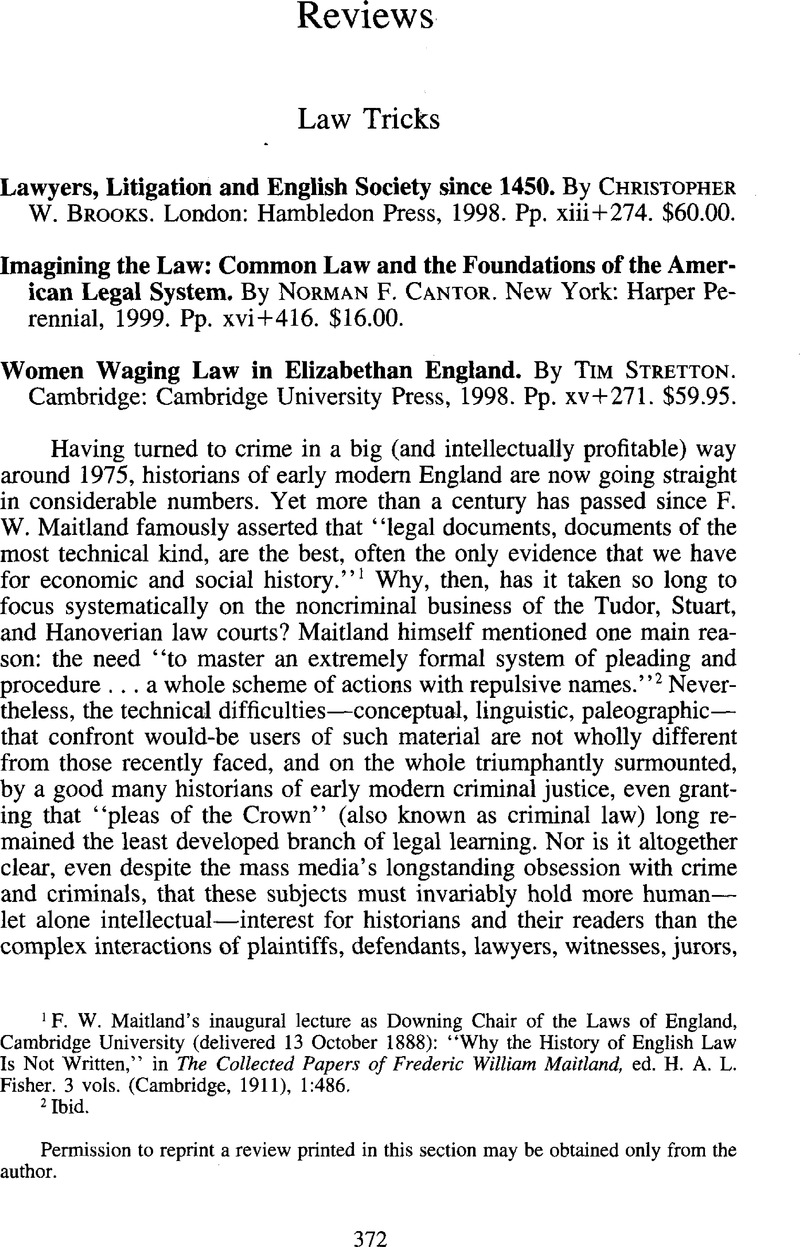No CrossRef data available.
Article contents
Law Tricks - Lawyers, Litigation and English Society since 1450. By Christopher W. Brooks. London: Hambledon Press, 1998. Pp. xiii + 274. $60.00. - Imagining the Law: Common Law and the Foundations of the American Legal System. By Norman F. Cantor. New York: Harper Perennial, 1999. Pp. xvi + 416. $16.00. - Women Waging Law in Elizabethan England. By Tim Stretton. Cambridge: Cambridge University Press, 1998. Pp. xv + 271. $59.95.
Review products
Published online by Cambridge University Press: 10 January 2014
Abstract

- Type
- Reviews
- Information
- Copyright
- Copyright © North American Conference of British Studies 2000
References
1 F. W. Maitland's inaugural lecture as Downing Chair of the Laws of England, Cambridge University (delivered 13 October 1888): “Why the History of English Law Is Not Written,” in The Collected Papers of Frederic William Maitland, ed. Fisher, H. A. L.. 3 vols. (Cambridge, 1911), 1:486Google Scholar.
2 Ibid.
3 Brooks, C. and Lobban, M., eds., Communities and the Courts in Britain, 1150–1900 (London, 1997), p. ixGoogle Scholar.
4 Brooks, C. W., “Interpersonal Conflict and Social Tension: Civil Litigation in England, 1640–1830,” in The First Modern Society: Essays in English History in Honour of Lawrence Stone, ed. Beier, A. L., Cannadine, D., and Rosenheim, J. M. (Cambridge, 1989), pp. 357–99Google Scholar.
5 Pocock, J. G. A., The Ancient Constitution and the Feudal Law: A Study of English Historical Thought in the Seventeenth Century: A Reissue with a Restrospect (Cambridge, 1987)Google Scholar.
6 Baker, J. H., An Introduction to English Legal History, 3d. ed. (London, 1990)Google Scholar; and Harding, A., A Social History of English Law (Harmondworth, 1966)Google Scholar.
7 Erickson, A. L., Women and Property in Early Modern England (London, 1993)Google Scholar.
8 Clark, A., Working Life of Women in the Seventeenth Century, ed. Erickson, A. L. (London, 1992)Google Scholar.
9 Churches, C., “False Friends, Spiteful Enemies: A Community at Law in Early Modern England,” Historical Research 71 (1998): 52–74CrossRefGoogle Scholar, “Women and Property in Early Modern England: A Case Study,” Social History 23 (1998): 165–80CrossRefGoogle Scholar; and Muldrew, C., The Economy of Obligation: The Culture of Credit and Social Relations in Early Modern England (Basingstoke, 1998)CrossRefGoogle Scholar.


